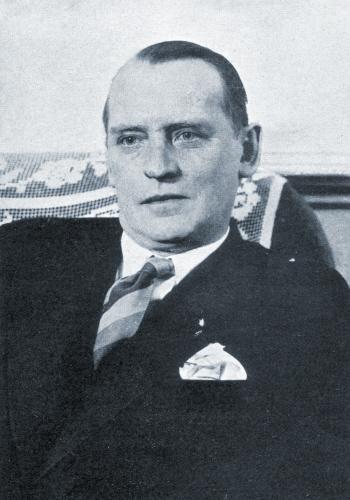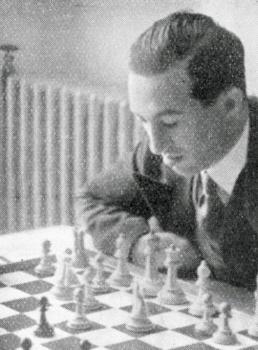
Edward Winter
(2004)

Alexander Alekhine
Mig Greengard (New York) refers us to page 48 of Liliana Najdorf’s book Najdorf x Najdorf (Buenos Aires, 1999), which features M. Najdorf’s account of a conversation with Alekhine in Buenos Aires in 1939. Over whisky they discussed how many games they had played against each other, and after a claim by Najdorf of three games (2-1 in his favour) Alekhine stated that there had been only two, both drawn. To this Najdorf retorted that in Poland in 1929 Alekhine had given a simultaneous display on 30 boards plus two blindfold games and that Najdorf had been his opponent in one of the games played sans voir. Alekhine then replied: ‘Thirty games plus two blindfold … You sacrificed a rook on R7? It’s you. You’re right.’
Pointing out that Alexander Alekhine’s Chess Games, 1902-1946 by L. Skinner and R. Verhoeven (Jefferson, 1998) contains only one game involving the two masters (a draw in Warsaw in 1935, with Najdorf one of three consultants facing the then world champion), Mr Greengard asks if information is available on any other play between the two masters.
We have a number of observations to make:
a) This topic was raised in C.N. 1660 following the publication of an interview given by Najdorf to Eduardo Scala on pages 22-28 of the June 1988 Revista Internacional de Ajedrez (see page 307 of Kings, Commoners and Knaves). In essence, Najdorf’s story was the same, except that in the Spanish magazine he gave the occasion of the blindfold game as Warsaw, 1927 rather than 1929 and stated that there were 40, not 30, simultaneous games, in addition to two played blindfold. Moreover, Najdorf said, Alekhine mentioned the two draws as having occurred in Warsaw and Prague.
b) Discussing a simultaneous exhibition by Alekhine in Warsaw on 2 December 1928, L. Skinner and R. Verhoeven wrote on page 342 of their above-mentioned book:
‘In this display Alekhine played on 29 boards, two of which he played blindfold. He won 19 games including both the blindfold ones, drew six and lost four. In the bulletins of the 1956 Alekhine Memorial Tournament many prominent grandmasters who were present in Moscow were asked to contribute their reminiscences about Alekhine. Miguel Najdorf in Turnir Pamyati Alekhina 1956, n5, page 5 claimed that he had first played against Alekhine as one of the blindfold players in this display. He dated the exhibition as 1929, a year for which no record exists for Alekhine being in Poland. Furthermore, he claimed that he won his game. Clearly this is not in accord with the above record, which was taken from Świat Szachowy 1928, n11/12, page 13.’
c) The topic was also mentioned on pages 66-69 of Miguel Najdorf El Hijo de Caissa by Nicolás Capeika Calvo (Buenos Aires, 2002). The author was unable to provide any further evidence but expressed the view that Najdorf was ‘exageradamente honesto’ and would not conceivably have been untruthful or mistaken about such a matter. With respect to the discrepancy over the year of the blindfold game, Capeika Calvo regarded any such slip as minor, there being only one month’s difference between December 1928 and 1929.
d) Concerning the 1988 interview’s reference to one game having been played in Prague, we should welcome information on any visits by Najdorf to the Czech capital during Alekhine’s lifetime.
e) We are aware of no record of chess being played by Alekhine in either Warsaw or Prague in 1927 (the year given in the 1988 interview).
f) Neither the 1988 interview nor the passage in Liliana Najdorf’s book refers explicitly to the 1935 consultation game, which leaves it unclear whether Alekhine and Najdorf were including that encounter in their respective tallies.
g) The public record on Alekhine’s simultaneous displays inevitably contains gaps. For instance, C.N. 3153 presented Sidney Bernstein’s account to us of having played against Alekhine in Paris circa 1934, although no newspaper or magazine report of the occasion has been traced. On the other hand, it may be considered that Polish (and Czech) publications were far more assiduous in chronicling Alekhine’s activities than were French outlets.
h) Not all of Najdorf’s other statements in the 1988 interview stand up to scrutiny, and we gave an example, concerning Rubinstein, in C.N. 1660. He was in full flow, and it is hard, if not impossible, to know how truthful some of his assertions were. For example, was Tartakower really an ‘intimate friend’ of Charles de Gaulle, also being offered a political post by the General? Did Najdorf really meet Nimzowitsch on various occasions in a Copenhagen café? And did he really play three times against Rubinstein, shortly before the latter’s death?

M. Najdorf
(3367)
From Yasser Seirawan (Amsterdam):
‘During the Americas v Europe match-tournament in Mar del Plata in 1981, as well as at subsequent meetings, Najdorf told me a similar story to the one in C.N. 3367, but with some different details. The Polish club, he claimed, deliberately annoyed Alekhine by announcing that only 20 players had paid for the privilege to participate, and Alekhine insisted on being paid the agreed fee despite having only half the field. Reluctantly, the club directors agreed and proposed that Alekhine play ten games by sight and ten blindfold. Alekhine agreed. The club then snuck all the best players into the blindfold room and put ten patzers on the games that Alekhine could view. Just as the club directors had contrived, Alekhine had a terrible time. He wiped out the players he could see and sat racking his brains on the blindfold games, where the masters were in ambush.
Concerning his own game, Najdorf told me he was on the black side of a Sicilian in which the players had castled on opposite wings. Alekhine was breaking through when Najdorf uncorked the standard …Rc8xc3 exchange sacrifice. Alekhine had seen that shot and did not bother to recapture the rook, pursuing his own attack instead. The move he had missed was the follow-up …Rc3xa3, and Najdorf’s attack was first and decisive.
Najdorf added that many years later he had hosted Alekhine in a drinking bout in Buenos Aires. They both got thoroughly drunk. In a toast Najdorf declared Alekhine the greatest chessplayer ever but added, “Just remember: our score is one draw and one win in my favor”. Alekhine maintained that even if drunk he knew that their score was one draw. Najdorf then reminded Alekhine of the Polish display, and Alekhine said, “Are you the one who gave me …Rxa3?” Najdorf was astounded at Alekhine’s memory, even when he was intoxicated.
Najdorf was a great storyteller but certainly prone to exaggerate. I would be interested in knowing whether this particular tale is myth or fact.’
(3369)
Christian Sánchez (Rosario, Argentina) reports that an account by Najdorf in a 1997 interview is available on-line.
(8714)
Eduardo Scala’s above-mentioned interview with Najdorf on pages 22-28 of the June 1988 Revista Internacional de Ajedrez was reproduced on pages 67-78 of his book El juzgador de AjedreZ (Madrid, 2014).
See too Miguel Najdorf (1910-97), Najdorf against the French Defence and The Polish Immortal.
To the Chess Notes main page.
To the Archives for other feature articles.
Copyright: Edward Winter. All rights reserved.